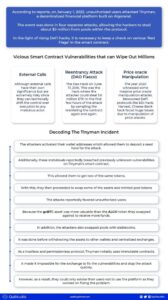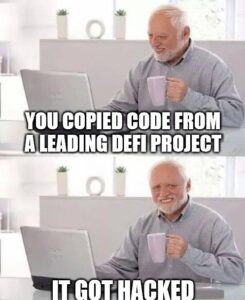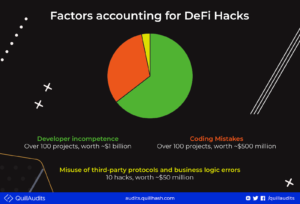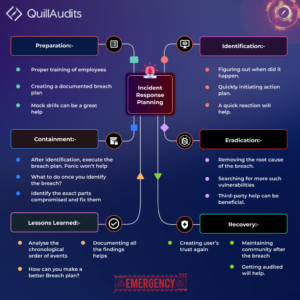As decentralized networks, blockchains are immune to conventional threats faced by centralized systems. However, it doesn’t mean that blockchains are free of vulnerabilities. One of the weak links on blockchain networks are unaudited smart contracts, which could provide a foothold to the hackers to take advantage of. Let’s discuss that how smart contract audits can help to prevent attacks on blockchain based systems.
Today, there are several blockchain networks – Ethereum, BSC, EOS, and many more – you can create your smart contracts on. Ethereum and BSC allow you to use Solidity, which is a language specifically developed for making smart contracts. On EOS, you can use common programming and scripting languages such as C++ and JavaScript. Regardless of the languages used, there is a probability of vulnerabilities in smart contract code or virtual machines.
Let us examine the possible vulnerabilities:
Weak spots in contract source code
If developers have left vulnerabilities in the source code because of logic or code error, all stakeholders in the smart contract face the risk. For instance, a smart contract may end up paying millions of dollars to a wrong address, or simply burn the funds. Solidity has a known vulnerability – reentrancy attack – where a smart contract passes over the control to untrusted function from external smart contracts.
In other words, contract X calls a function from contract Y that has been maliciously designed or has an undefined behavior. Contract Y now takes over the functioning of contract X, possibly triggering unauthorized transfer of funds, resetting of parameters, and other such objectives.
Weak spots in virtual machine
In a blockchain architecture, the role of the virtual machine (VM) is to create the proper execution environment for the smart contracts. VMs ensure this by abstracting the network and making it function as a single supercomputer, capable of solving numerous computational tasks. Common vulnerabilities in the VM are given below:
Bugs in access control – Solidity has a missed modifier bug which allows an unauthorized person to get access to sensitive functionality in the contract.
Coins lost in transfer – The smart contract might transfer coins to an orphaned address that is a crypto address without any owner. This results in the loss of coins forever.
Short address attack — This attack vector opens up when VM is open to incorrectly padded arguments. This vulnerability can be exploited by sending specifically created addresses to the VM. The successful attack on the Coindash ICO in 2017 is a notable mention in this context. Using this vulnerability, the hackers modified the Coindash Ethereum address, resulting in the victims sending their crypto to the address the hackers wanted!
Immutable defects – Immutability is a primary feature of blockchains which means smart contracts cannot be interfered with once they are deployed. However, the downside is that bugs in the code become impossible to fix as well. Some of these bugs, when left unchecked, may create havoc, or cybercriminals may discover them and exploit the weak link to steal crypto coins.
DDoS attacks – Hackers may deploy the general idea behind DDoS (distributed denial of service) attack to overwhelm the smart contract. For instance, if it is a shopping contract, attackers can constantly call the shop () function to prevent other users from shopping.Integer overflows – When an integer variable looks to store the value which outstrips its limit, overflow situation arises. During the batchOverflow hack of the ERC digital coins, attackers exploited this issue. They interfered with some of the ERC20 contracts and got hold of coins.
Benefits of smart contract audit
A full-fledged smart contract audit, comprising automated tools as well as hands-on review from seasoned auditors, ensures your contract is ready to go and free of all types of vulnerabilities.
Prevention of costly errors
Unknown errors in the code have the potential to destroy your business or even have you face court cases. Getting your code audited in the early stage of the development lifecycle helps you protect yourself from such expensive errors.
Assessment of vulnerabilities
The audit team will review the contract to determine the degree of danger in the bugs present. They analyze the possible consequences of these bugs and recommend the way ahead.
Easy integration of automated tools
You may have automated tools integrated into your development environment, enabling you to perform continuous security analysis as the coding progresses, leaving the manual review for a later stage.
Detailed analytics report
You receive a detailed vulnerability report mentioning explicitly about bugs, their degree of vulnerability, and recommendations.
Smart contract audit platform
Closing thoughts
Smart contract audits is one of the foremost steps you need to take to ensure the security of your code. Taking on board a reputable company for the audit helps you avoid the possible loss of millions of dollars and the clients’ trust. It also showcases your resolve to protect users. Discovery of the level of vulnerability and the recommendations enable you to determine the extent you want to go for fixing the bugs, depending on your overall objectives and perception of threats.
Reach out to QuillAudits
QuillAudits is accomplished in delivering efficient smart contract audits. If you need any assistance in the smart contracts audit, feel free to reach out to our experts here!
Follow QuillAudits for more updates
- access
- ADvantage
- All
- analysis
- analytics
- architecture
- arguments
- audit
- Automated
- blockchain
- board
- Bug
- bugs
- business
- call
- cases
- code
- Coding
- Coins
- Common
- company
- contract
- contracts
- Court
- crypto
- cybercriminals
- DDoS
- decentralized
- DeFi
- delivering
- Denial of Service
- destroy
- developers
- Development
- digital
- Digital Coins
- discovery
- dollars
- Early
- early stage
- Environment
- EOS
- ERC20
- ethereum
- Exploit
- Face
- Feature
- Fix
- Free
- function
- funds
- General
- hack
- hackers
- hold
- How
- HTTPS
- ICO
- idea
- integration
- IT
- JavaScript
- language
- Languages
- Level
- LINK
- Machines
- Making
- network
- networks
- open
- opens
- Other
- owner
- present
- Programming
- protect
- report
- Results
- review
- Risk
- security
- Services
- Shopping
- smart
- smart contract
- Smart Contracts
- solidity
- Stage
- store
- successful
- Systems
- The Source
- threats
- Trust
- us
- users
- value
- Virtual
- virtual machine
- Vulnerabilities
- vulnerability
- words
- X













